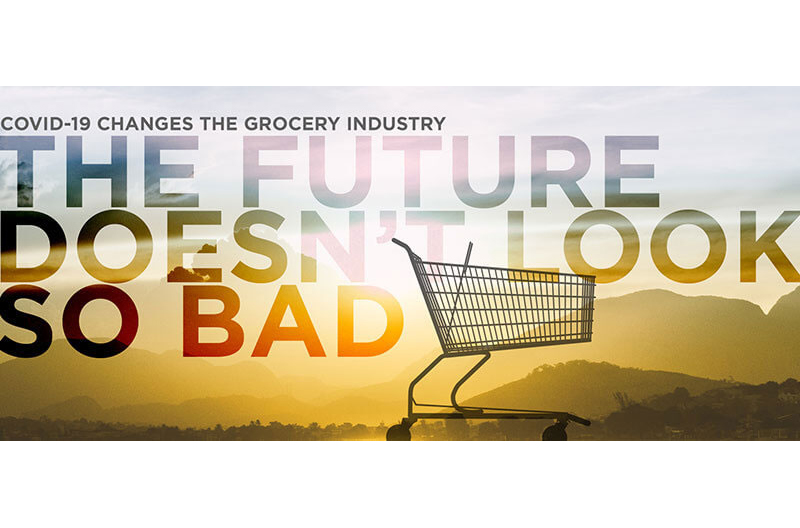by Aleya Jennings
Gatesman
It is obvious that the Covid-19 pandemic is changing everything in the world right now. While an infinite number of questions remain about what to expect in our new normal, it may be my upbeat nature but I’m especially curious to explore some of the positives that may emerge from our current constraints.

For more than a decade, I’ve earned a living developing integrated marketing communications strategies for clients in retail and grocery categories and, like my peers, I’ve never experienced anything similar to the current global crisis. Every day my team and I are focused on how the pandemic is changing shopping behaviors. We’re working with our clients to keep consumers updated on inventory, health and wellness protocols, how they can safely shop and ways in which the collective “we” can protect our communities and each other. In addition, we’re also exploring which pandemic behaviors will have a lasting impact after this is over. Will grocery suppliers change their purchasing behaviors for essential products? Will social distancing continue to be a thing?
Before I go further, it’s also important to note that I’m the primary shopper for my household, adding yet another reason why I’ve decided to investigate some of these questions. (Yes, I am a woman who still prefers to do the grocery shopping! Besides, if my husband went to the store, he would come back with food that a 15-year-old boy would enjoy, and I’m not about to live on hot dogs and ramen!)
My curiosity led me to research previous shifts in behavior within the grocery category following other historic economic shakeups, such as the 2007-09 recession. So, I analyzed shifts we are already seeing as a result of the pandemic and what the lasting impact will be on the grocery industry. My initial thoughts and predictions are captured below, exploring the changing methods for grocery shopping, perspectives on freshness/organic, impact on pickup and delivery, and ongoing mindful awareness of physical distance between shoppers and how social distancing may have a more permanent resonance with shoppers.
Question 1: How will the pandemic change how people grocery shop?
My hypothesis: more eating at home, less frequent, but larger grocery trips and increased grocery bills and continued growth of private label.
During the 2007-09 recession, we saw an uptick in the number of families who ate at home rather than dined out. This shift was motivated by a lack of financial resources. Financial limitations also birthed additional behaviors such as acceptance of purchasing private label brands, which spurred the growth of some discount retailers specializing in only private label products.
The recession also motivated an increased frequency of store trips driving customers to find the perfect combination of price, quality and convenience. As time evolved, the trinity of price, quality and convenience evolved to customers putting more emphasis on the quality of product they were purchasing first, for a price they were comfortable with affording second, at a “convenient” location third. Convenience in this sense is fluid; driving 25 minutes away could be considered convenient if the store carries customers’ preferred products.
These trends were primary shopping behaviors that sustained until about February 2020, prior to the World Health Organization declaring a “public health emergency of international concern” regarding the outbreak of Covid-19.
Although Covid-19 started as a novel virus, it has impacted every industry, uprooting people’s lifestyles by forcing them to self-quarantine at home. It has also impacted jobs and financial stability as the number of layoffs has already accelerated. People are making their homes their command center—they work, play, go to school and exercise at home—and dining is no different. Covid-19 has forced people to get reacquainted with their kitchens and cooking. Is anyone else baking random stuff with ingredients that should not go together? Same! Final product was great though.
After this difficult period is mostly behind us, I cannot imagine that will change. People will be focused on regaining financial stability and will have realized they no longer need “stuff” to live a meaningful life when basic needs can be met at home. This enlightenment and circumstance will drive people to do more cooking and entertaining at home, which will result in increased grocery shopping.
People also will change the ways they shop. From my personal experience, there was literal pandemonium at grocery stores, with people fearing that they will not have what they need to sustain their families during a “hunker down” period. This fear is going to drive bulk shopping, and big box stores will continue seeing growth as customers are purchasing larger quantities
Another behavior born from the recession that we will see continue post-Covid is the purchase of private label products. The secret is out—and consumers have realized that private label brands are comparable to national brands, for a lower cost. The frightening experience of exposure to shortage during Covid-19, paired with an economic downturn, cannot help but have a lasting impact, and I predict that the number of grocery store trips decrease and basket/cart sizes increase. Private label will continue to be on the rise.
For retailers, the decreased regularity in shopping trips will likely mean a change in projected business revenue, how wholesale quantities are purchased, how shelves are stocked and maybe even a change in loyalty programs. It is too early to tell, but there will be a lasting impact on the future. Dining at home comes with changes in behavior for the consumer and the retailer.
Question 2: Is fresh and organic still going to be the craze?
Yes, but the relationship with this type of consumption may look different.
Health, nutrition and wellness have been buzzwords for some and lifestyles for many. This is not changing—since people are cooking at home, folks will be even more conscious of what they are putting into their bodies. Plus, knowing that a virus (not to be taken lightly) caused this hysteria and disruption to our current landscape, people are going to constantly think about whether what they are putting into their bodies will fuel it or cause harm.
As I mentioned, some consumers were shopping multiple times a week, and now, maybe once a week or every two weeks. Products like fresh produce will not stand the test of time; however, frozen produce will. I see the frozen produce category growing exponentially. People are going to want to continue eating a nutritious and balanced diet but know that their grocery trips will decrease. The frozen category has expanded to where you can easily find organic, gluten free, keto; name your diet preference and allergy and it is there, and the taste and quality are pretty great! And let’s be real, cooked frozen broccoli tastes the same as cooked fresh broccoli!
Question 3: Will grocery retailers need pickup and delivery to survive?
Undoubtedly. The Covid-19 pandemic is changing some major areas in our lives, like economic and employment status, grocery patterns and how we receive medical treatment. It is changing other staples, too, like how we socialize, engage with our places of worship and communicate.
Grocery stores will have to get on board or be left behind. Home has become headquarters—you never have to leave to get what you need and want. Grocery shopping is no different. We are only scratching the surface of what grocery delivery and pickup looks like. Robots, virtual reality experiences, people-less grocery stores and real-time delivery are on the horizon for sure.
Question 4: Will people be more mindful of space, respectful of time and conscious that others have enough food and products to survive?
Personally, I sure hope so. We have been forced to be our authentic selves, right? Video chatting with our colleagues whose kids are running around and interrupting, no makeup, hair all over the place and kitchen appliances going off—all at the same time. For the time being, we just have to be OK with that; OK with being imperfect humans with a lot going on. If this virus has given us anything positive, it has given us the reminder of grace. Grace for ourselves and grace, mindfulness, consciousness and support for others. This is probably the most solidarity I’ve seen in my life across the nation. It is a shame it took something so drastic to bring us together.
So, yes, I am hopeful and predict that we will see more awareness of and courtesy for others from those in the grocery aisles and beyond. Remembering their Covid-19 experience, more people will make sure they are leaving enough for others, creating space and distance between themselves and other patrons to look for what they need in the aisles (or virtual aisles) and check out. Memories of their time during the pandemic also will prompt people to slow down a bit, to ensure they are getting everything they need to sustain themselves and the people they care about—and frankly those they do not even know.
What are the lasting impacts of the Covid-19 pandemic on the grocery category?
My final key takeaways:
- Consumers will be doing a lot more cooking at home and spending less time and resources eating out;
- Consumers will be more focused on health, nutrition and wellness;
- Private label sales will continue to increase;
- Bulk shopping will be making a comeback—increased basket sizes and decreased trips to the store (or delivery/pickup);
- We may see an uptick in frozen sales, including frozen produce;
- Grocery delivery and pick up services will become more advanced; and
- Social distancing may bring mindfulness and respect to how people shop and exist.
Aleya Crable Jennings is AVP, group account director of the retail division for Gatesman. She has more than 10 years formulating marketing communications strategies with expertise in the grocery category.

